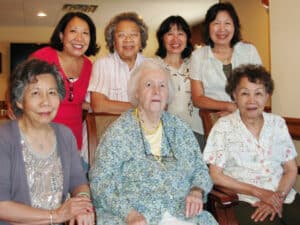
When a new wave of Chinese immigrants arrived in Minnesota after World War II, they were told if they needed anything at all, they should see “Jangu.”
The name, pronounced Jane-Goo, stood for “Aunt Jane.” She was Jane Wilson, a white Sunday school teacher and superintendent at Westminster Presbyterian Church in Minneapolis, then a first stop for families from southern China.
Wilson became a one-woman social service agency for Chinese-Americans. She taught them English, named their babies, and forged friendships that have endured several generations. On Sunday, the Chinese Heritage Foundation will recognize Wilson for her contributions as an “honorary Chinese Minnesotan.”
In the days after the war, she also became a treasured resource for the Chinese brides of returning Chinese-American veterans.

Wilson, now 95, has been a fixture in local Chinese-American circles for more than 60 years, according to Oy Huie Anderson, a friend. Huie Anderson, whose family immigrated in the 1920s, said Wilson was the one constant that united many of the Chinese families in Minnesota.
“I think at one point, Jane knew more Chinese families in the Minneapolis area than any one person,” said Huie Anderson, 77.
Jane Wilson also came to love authentic Chinese dishes. Thanks to her friends, she turns her nose up at chow mein.
“I have eaten more good Chinese food — I mean, good Chinese food — than any Caucasian in Minnesota,” she said.
Another friend, Linda Woo, said Wilson was proud of every milestone reached by Woo and her siblings.
“We always made sure she was part of our major celebrations — the first-born son, the red-egg parties, the weddings, and now the funerals of our parents,” said Woo, 61. “And she’s always there.”
Chinese immigrants Photo courtesy of Minnesota Historical Society

Wilson, who had lived mostly in Georgia and the Carolinas, was in her 20s when she came to Minnesota, first as a visitor in 1942. She had never even seen a Chinese person before, and that’s what intrigued her about getting to know them.
A few years later, after she moved to Minneapolis and began teaching Sunday school at Westminster church, it was clear that 13-year-old Oy Huie and her classmates had never met anyone quite like Wilson.
“Oh, how they giggled,” Wilson said of the six girls. “And I just thought they were giggling because they were teenage girls. But why did you giggle, Oy?”
“Because you talked funny,” Huie Anderson replied.
“I talked funny because I was from the South,” Wilson said. “They’d never heard anyone talk with a Southern accent.”
Wilson keeps all of her black-and-white photos from her days with the church in meticulous three-ring binders. She is pictured juggling toddlers in her lap, and helping kids blow out the candles on a birthday cake.
She also wrote letters to federal officials from Minnesota on behalf of Chinese immigrants who wanted to bring the rest of their families over from their homeland.
Long before Jane Wilson was born, the first wave of Chinese began to settle in Minnesota in the 1870s and 1880s. Ironically, these new Minnesotans arrived at about the same time the U.S. government passed discriminatory laws excluding the Chinese from entering the country, said Sherri Gebert Fuller, author of the book “Chinese in Minnesota.”
In the late 19th century, the climate for many Chinese-Americans who had already settled in the United States was hostile.
On some parts of the West Coast, “actual towns and villages were burned to the ground,” Gebert Fuller said. “Because of the economic downturn in 1870s, tensions turned to the Chinese because there were so many people who immigrated to California. And people wanted to blame someone or something.”
Facing blatant hostilities on the West Coast, Chinese-Americans moved to Minnesota, where they heard the people and policies were more welcoming. The men opened laundries and restaurants, Gebert Fuller said, “because those were the only opportunities open to them, again because of discrimination factors.”
The women of Westminster Church, which had a long history of mission work in China, started a Chinese Sunday school in 1882 to help the newcomers adjust.
As the by then English-speaking Chinese community became more integrated into American life, Wilson said, church leaders considered dismantling the Chinese school — until one fall day in 1947, two years after the end of World War II.
“One Sunday, we were sitting there, and here are these strange girls coming in,” Wilson said.
Some of the girls were still in their teens, and had just arrived from China. They had been plucked by Chinese-American servicemen who lived in Minneapolis and went back to China to find their wives after the war.
Wilson said she could see the culture shock on the faces of the “war brides,” who hailed from the hot, sticky climate of Guandong Province and spoke not a word of English.
“Just imagine the courage that it took them to come,” she said. “We were delighted to have them. And we saw a busy future ahead.”
Though impressed, the teachers wondered: “What are we going to do with all these girls?” she said.
Wilson taught them practical phrases they could use while at the store or while riding streetcars. She gave their children English names, at their parents’ request. One of those war brides was Lila Woo, Linda Woo’s mother.
“It’s just amazing that these women did as well as they did,” Woo said. “My mother popped out four of us in five years. … We’re all married, we have children, we all are college educated. And a lot of this credit goes to Jane Wilson.”
On Sunday, the Chinese Heritage Foundation will honor Wilson for what it describes as her compassion, her faith in the resiliency of the immigrant spirit, and for serving as a “loving and caring mother” for so many who were not her kin.
By Laura Yuen · Minneapolis · Oct 15, 2010
